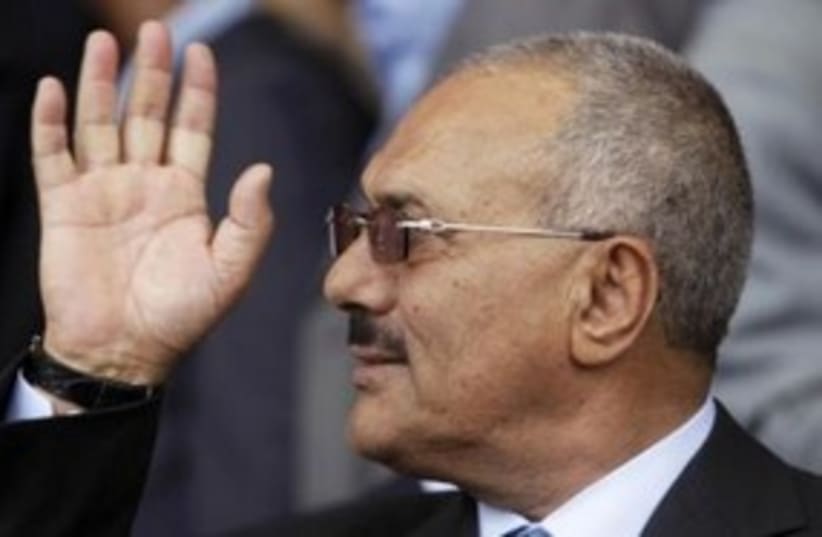Yemen clashes turn deadlySaleh was injured in an attack on the presidential palace on Friday. Saudi Arabia and other Gulf States have been urging him to sign a Gulf-led deal to step down and end his nearly 33-year-rule over Yemen.Also on Saturday, a Saudi source told Reuters Saudi Arabia has brokered a fresh truce between a powerful Yemini tribal federation and forces loyal to Saleh.The two sides agreed to a truce a week ago brokered by the Saudis but it only held for about a day as they began fresh street battles in Sanaa that killed scores this week.Gulf and global powers, including Saudi Arabia, have been pushing Saleh to sign a deal to step down. Leaving the country, even for medical treatment, could be seen as the first step in a transfer of leadership.There are growing worries that Yemen, already on the brink of financial ruin and home at al-Qaida militants, would become a failed state that poses a threat to the world's largest oil exporting region and to global security.Residents in Sanaa faced new fears after fighting between a powerful tribal federation and Saleh's forces spread to new parts of the divided city on Friday, prompting a fresh exodus of war-weary civilians."Saleh is still in Sanaa," a Yemeni official told Reuters."He had suffered minor wounds to his head and I believe his face."Nearly 200 people have been killed in the past two weeks in urban battles with machine guns, mortars and rocket propelled grenades that caused Sanaa's airport to briefly ground flights twice and shuttered shops.Intermittent blasts and sporadic fire fights punctuated the predawn hours in Sanaa. Roads were clogged when the sun rose by civilians fleeing violence that has engulfed more of the city."Bullets are everywhere, explosions terrified us. There's no chance to stay anymore," said Sanaa resident Ali Ahmed.Spain said it is evacuating its citizens and diplomats in Yemen and Germany ordered the temporary closure of its embassy, adding to the number of countries shutting the doors on their diplomatic missions in Sanaa due to the fighting.On Friday, several Yemeni officials were injured and seven killed when shells hit a mosque in the presidential palace, state media said. Saleh's forces retaliated by shelling the homes of the leaders of a the Hashed tribal federation fighting an urban battle to oust Saleh.Saleh, a tenacious political survivor who has clung to power for nearly 33 years, said in an audio address late on Friday that an "outlaw gang" was behind the attack, which he blamed on the Hashed tribe.The Yemeni official told Reuters: "It's not easy for the president. He has lost people close to him and who were sitting next to him when it happened."Nearly 400 people have been killed since a popular uprising against Saleh began in January, inspired by the movements in Tunisia and Egypt that toppled their long-standing leaders.
Report: Saleh headed to S. Arabia for medical treatment
Arab media reports Yemeni president has indeed left the country following attack on palace; Saudi Arabia says they have mediated fresh ceasefire.

Yemen clashes turn deadlySaleh was injured in an attack on the presidential palace on Friday. Saudi Arabia and other Gulf States have been urging him to sign a Gulf-led deal to step down and end his nearly 33-year-rule over Yemen.Also on Saturday, a Saudi source told Reuters Saudi Arabia has brokered a fresh truce between a powerful Yemini tribal federation and forces loyal to Saleh.The two sides agreed to a truce a week ago brokered by the Saudis but it only held for about a day as they began fresh street battles in Sanaa that killed scores this week.Gulf and global powers, including Saudi Arabia, have been pushing Saleh to sign a deal to step down. Leaving the country, even for medical treatment, could be seen as the first step in a transfer of leadership.There are growing worries that Yemen, already on the brink of financial ruin and home at al-Qaida militants, would become a failed state that poses a threat to the world's largest oil exporting region and to global security.Residents in Sanaa faced new fears after fighting between a powerful tribal federation and Saleh's forces spread to new parts of the divided city on Friday, prompting a fresh exodus of war-weary civilians."Saleh is still in Sanaa," a Yemeni official told Reuters."He had suffered minor wounds to his head and I believe his face."Nearly 200 people have been killed in the past two weeks in urban battles with machine guns, mortars and rocket propelled grenades that caused Sanaa's airport to briefly ground flights twice and shuttered shops.Intermittent blasts and sporadic fire fights punctuated the predawn hours in Sanaa. Roads were clogged when the sun rose by civilians fleeing violence that has engulfed more of the city."Bullets are everywhere, explosions terrified us. There's no chance to stay anymore," said Sanaa resident Ali Ahmed.Spain said it is evacuating its citizens and diplomats in Yemen and Germany ordered the temporary closure of its embassy, adding to the number of countries shutting the doors on their diplomatic missions in Sanaa due to the fighting.On Friday, several Yemeni officials were injured and seven killed when shells hit a mosque in the presidential palace, state media said. Saleh's forces retaliated by shelling the homes of the leaders of a the Hashed tribal federation fighting an urban battle to oust Saleh.Saleh, a tenacious political survivor who has clung to power for nearly 33 years, said in an audio address late on Friday that an "outlaw gang" was behind the attack, which he blamed on the Hashed tribe.The Yemeni official told Reuters: "It's not easy for the president. He has lost people close to him and who were sitting next to him when it happened."Nearly 400 people have been killed since a popular uprising against Saleh began in January, inspired by the movements in Tunisia and Egypt that toppled their long-standing leaders.